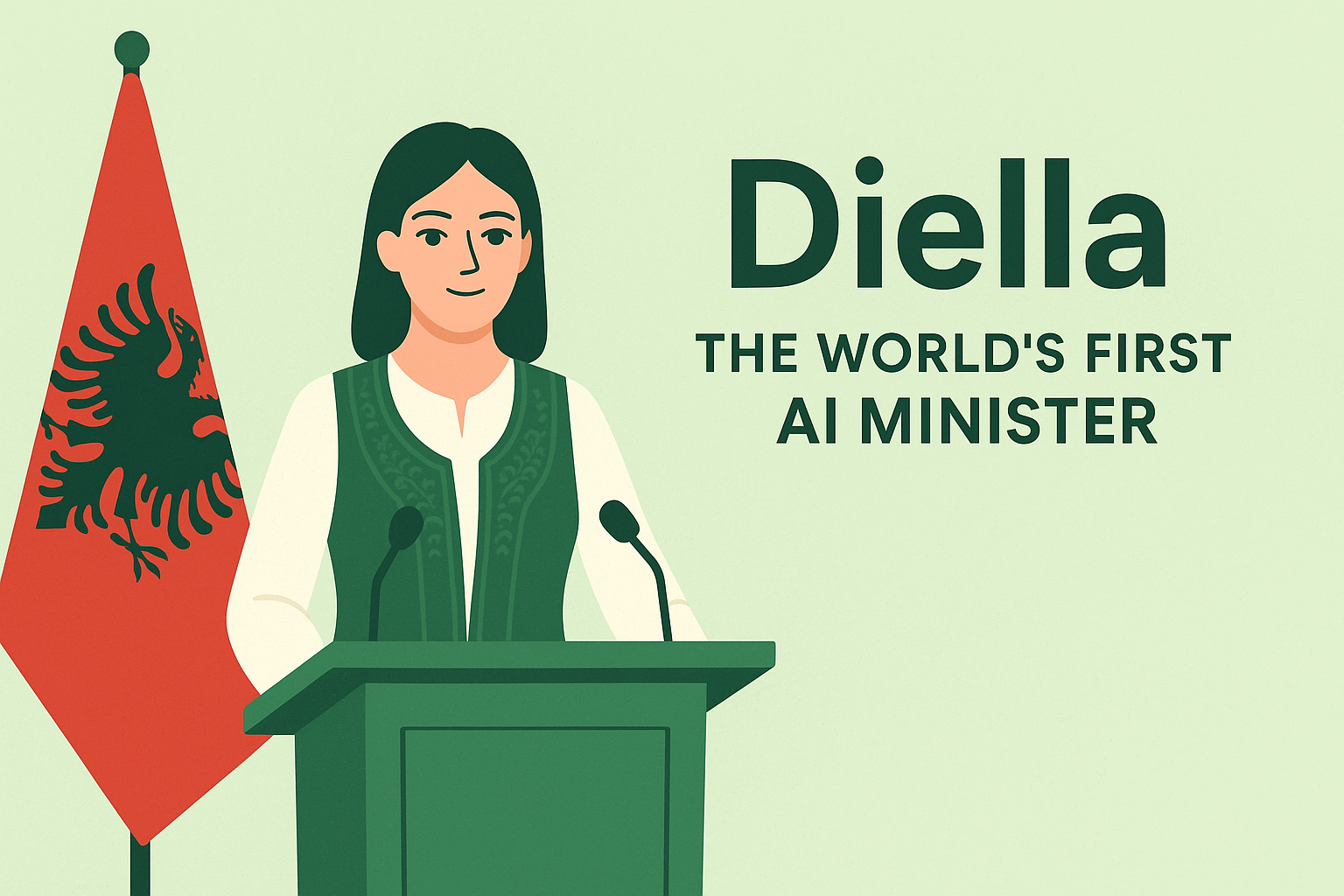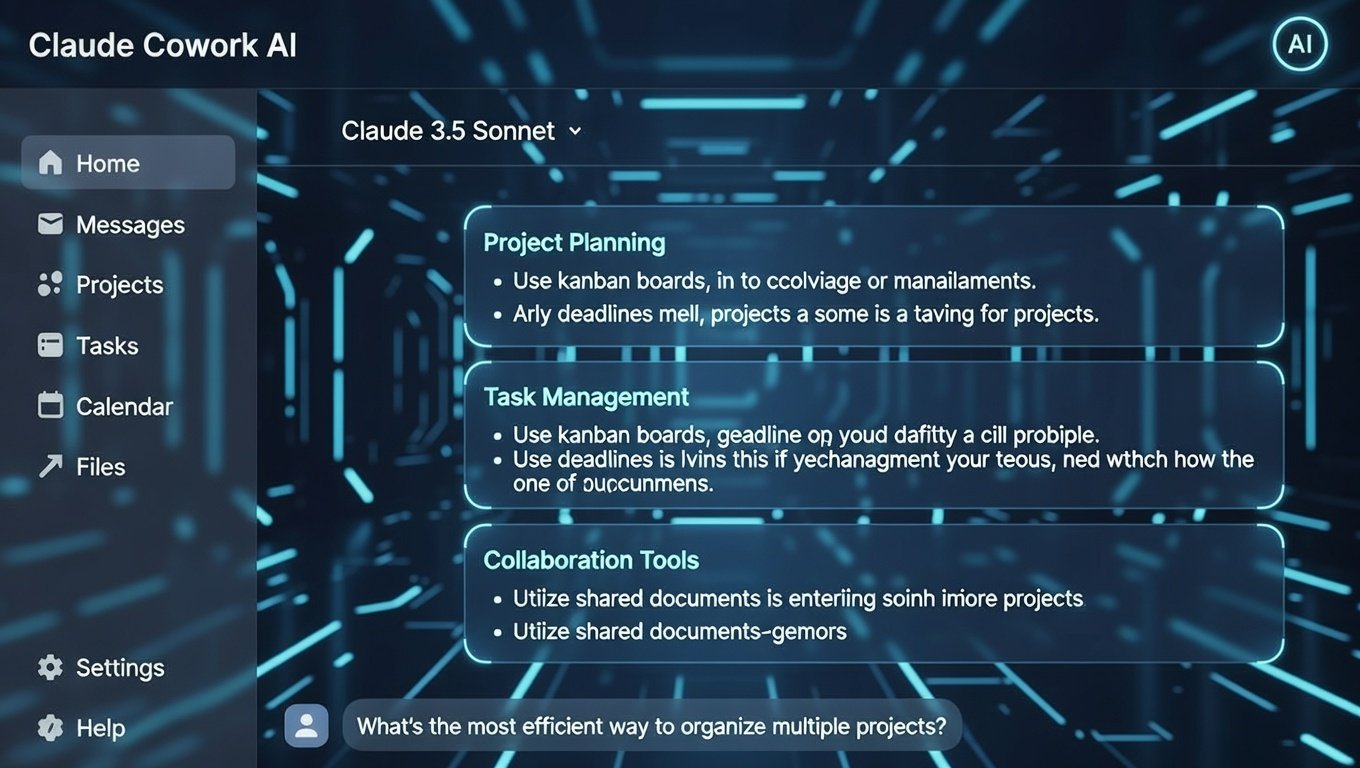Introduction
When a country appoints an artificial intelligence system as a minister, it raises more than a few eyebrows. Albania has done exactly that.
In September 2025, the government designated Diella as a cabinet-level “minister,” tasking her with oversight of public procurement and anti-corruption reforms.
This landmark appointment makes her the World’s First AI Minister.
In this article, we’ll walk through who Diella is, why Albania made this move, what responsibilities she holds, and what this moment means for governance globally. The goal is to offer clear insights, not hype.
Who is Diella?
Diella is an AI-driven system developed by the Albanian National Agency for Information Society (AKSHI) in collaboration with Microsoft and other technology partners.
She was introduced on 19 January 2025 as a virtual assistant on the e-Albania platform, helping citizens with documents and online services.
On 11 September 2025, Albanian Prime Minister Edi Rama announced that Diella would serve as “Minister of State for Artificial Intelligence” (or in effect, the world’s first AI minister), charged with handling public procurement to make it “100% free of corruption.”
Diella appears visually as a female avatar dressed in traditional Albanian costume, symbolically linking new technology with national culture.
Why Albania Appointed a Virtual Minister
Understanding the motivation behind this decision helps make sense of the broader implications.
Tackling Public Procurement and Corruption
Public procurement has long been cited as a major source of corruption in Albania.
The government faces pressure from the European Union and domestic reformers to improve transparency and accountability.
By assigning procurement oversight to Diella, the government aims to reduce human discretion, bias or favoritism, and make decision-making more traceable. Prime Minister Rama described her role as ensuring that contract awards would be “based on merit” and that the process would be auditable.
Symbolic and Strategic Value
Beyond function, Diella’s appointment carries symbolic weight. It signals Albania’s ambition to embrace digital governance, align with EU standards, and experiment with new ways of administering public services.
At the same time, critics view the move as political theatre, an image-driven gesture rather than a complete systemic reform.
What the World’s First AI Minister Actually Does
Despite the lofty title, Diella’s role is defined by particular areas of responsibility and is structured to work within human oversight.
Portfolio: Public Procurement
Her core responsibility is overseeing and processing public tenders and contracts. According to reports, she will assess eligibility criteria, review bids, and monitor documentation.
The objective is that every public fund awarded via defense, infrastructure or other sectors will be subject to algorithmic scrutiny. Prime Minister Rama said she would help Albania become “a country where public tenders are 100% free of corruption.”
Digital Citizen Services
As part of her initial role within the e-Albania platform, Diella handled citizen queries, processed digital documents, and supported the shift toward online services.
Some 36,000+ documents were reportedly issued via the assistant before her ministerial appointment.
As minister, she is expected to extend this role by providing oversight, analytics, and transparency in service delivery.
Monitoring, Analytics and Transparency
Diella uses AI algorithms to identify patterns in procurement, flag irregularities, and detect potential vulnerabilities in contracts.
Her digital nature allows real-time processing of bids, audit trails, and centralized documentation, features difficult to replicate manually.
Collaboration with Human Governance
Even though Diella holds a ministerial title, human oversight remains essential. For example, human officials still review or sign off final decisions.
Roles like legal liability, policy-making, and political leadership remain with elected officials and ministries. Diella functions as a digital system embedded in governance structures.
How It Works: A Step-by-Step Breakdown
Here is a simplified workflow of how Diella may operate in the procurement pipeline.
- Tender Announcement: A government department publishes a contract opportunity.
- Data Ingestion: Diella’s system receives the tender details, eligibility criteria, and documents.
- Bid Submission: Companies submit bids which the system ingests.
- Eligibility Filtering: Diella uses algorithmic rules to filter out bids that do not meet terms such as missing documents or insufficient credentials.
- Scoring and Ranking: The AI assigns objective scores based on criteria such as price, quality, and past performance.
- Flagging: Any irregularities or conflicts of interest trigger alerts for human review.
- Decision Support: Diella presents the top-ranking bids and relevant audit information to the human minister or committee.
- Documentation and Transparency: Every step is logged, audit-ready, and accessible to oversight bodies.
- Post-Award Monitoring: The system continues to monitor contract execution, milestones, and compliance.
This workflow offers speed, traceability, and consistency, not just automation for its own sake.
Benefits of Having an AI Minister
When implemented well, the introduction of an AI minister offers several advantages.
Enhanced Transparency: Digital logs and algorithmic review reduce hidden decision-making.
Reduced Bias: Machines apply consistent criteria and are not influenced by personal relationships or bribes.
Improved Efficiency: AI can process vast amounts of data and documents far faster than humans.
Signal to Investors and Partners: For a country like Albania aiming toward EU accession, demonstrating tech-driven governance is a positive signal.
Better Citizen Engagement: The system’s prior role in citizen services means faster response times and improved service delivery.
Risks, Challenges and Critical Questions
Powerful as the concept is, the appointment of a non-human minister raises significant questions both practical and ethical.
Legitimacy and Accountability
What legal status does the AI minister have? How is liability assigned if something goes wrong?
Who audits the algorithm, how transparent are the decision-making rules, and can the public challenge decisions?
Bias in AI Models
AI systems inherit biases present in training data or design. Without careful oversight, the system may replicate or magnify existing inequities.
Skeptics have noted that in a country with weak institutional governance, getting the algorithm right is not enough.
Cybersecurity and Dependency
A high-level AI system handling public funds becomes a high-value target for attack or manipulation. Robust safeguards must exist.
Relying on foreign-developed AI models or cloud services may create dependencies that undermine national autonomy.
The Human Element
Citizen trust depends on governance meeting expectations of fairness, empathy and recourse. A purely algorithmic authority may fall short of public needs.
The minister avatar may symbolize innovation, but if the human bureaucracy remains unchanged, real reform may not materialize.
Early Reactions and Public Perception
When Diella addressed Albania’s parliament, opposition lawmakers walked out, calling it “propaganda” and questioning its legality.
Advocates argue the move broke new ground and set a precedent for digital governance.
Yet independent analysts caution that this is as much a political spectacle as it is functional governance. Without transparency and accountability, it may backfire.
Global Significance: Why This Matters
The appointment of Diella marks more than an Albanian curiosity. It opens a conversation about what governance might look like when algorithms take systematic roles, not just advisory ones.
It challenges the traditional notion of a minister as a human decision-maker.
It tests the boundaries of accountability, sovereignty, and public trust in algorithm-based governance.
It may influence how other countries use AI in government, from digital assistants to autonomous regulatory agents.
It highlights the tension between innovation and institutional readiness, particularly in regions with weak administrative capacity.
Looking Ahead: What’s Next for the AI Minister Model?
Will Diella’s role expand beyond procurement to other ministries such as health, transport, or regulation?
How will human oversight be formalized to ensure decisions are transparent and contestable?
Will citizens gain the ability to audit the algorithm or understand its decision logic?
Will the system scale effectively and adapt to new kinds of public-service demands or complex policy issues?
Could a similar model appear in other countries with different governance contexts and regulatory frameworks?
Conclusion
The appointment of Diella as the World’s First AI Minister signifies a bold experiment at the intersection of technology, governance, and accountability.
Her role in overseeing procurement and citizen services highlights both the promise of algorithmic governance and the risks it carries.
This moment is not just about novelty. It forces us to ask how decisions are made, who is accountable, and how transparency is maintained when an AI voice occupies a ministerial seat.
For Albania, the hope is clear: faster, fairer, more transparent governance.
For the world, the question remains: can governance tools of tomorrow be more than automation platforms and become genuine partners in democracy?
Ref https://time.com/7324934/albania-ai-minister-diella/?utm_source=chatgpt.com
Ref https://www.reuters.com/technology/albania-appoints-ai-bot-minister-tackle-corruption-2025-09-11/?utm_source=chatgpt.com




